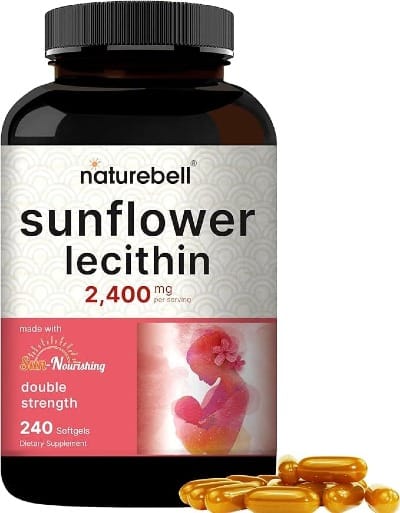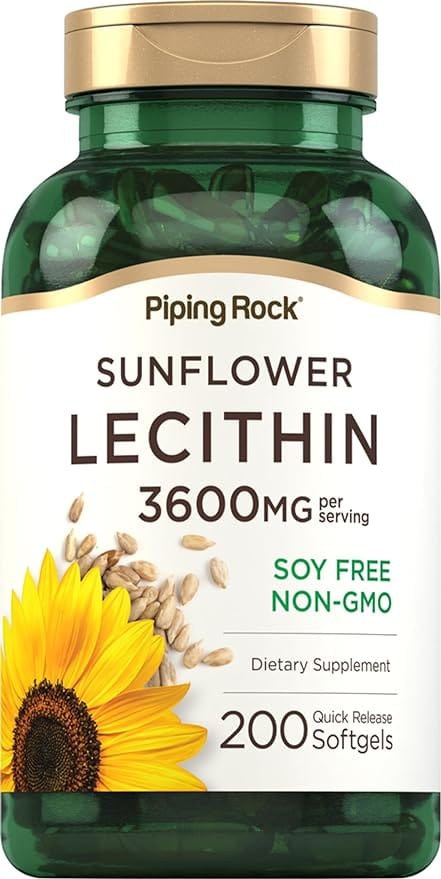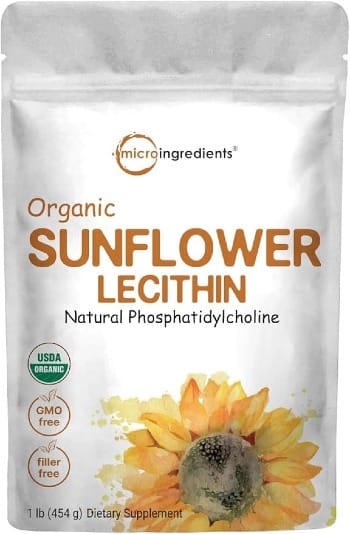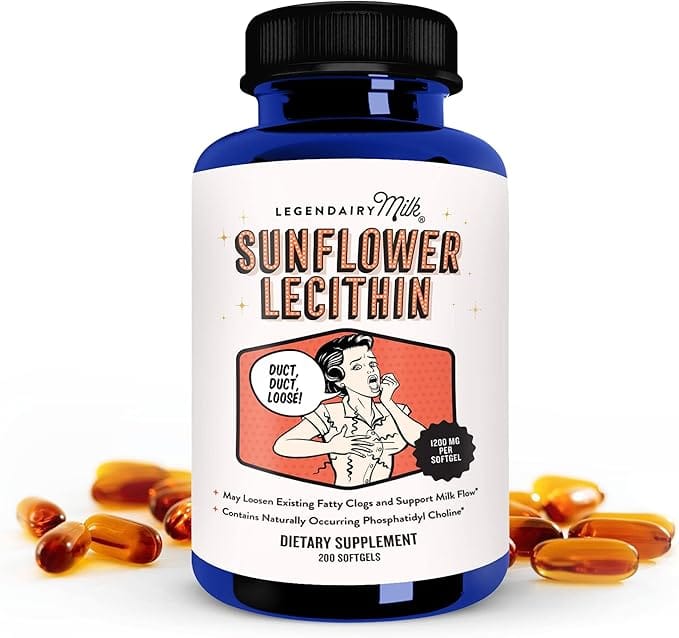Sunflower lecithin, a natural emulsifier derived from sunflower seeds, has been gaining attention in the health and wellness community for its potential benefits. While it's commonly used in food production and cosmetics, recent research suggests that this versatile compound may offer significant advantages for human health, particularly at the cellular level.

NatureBell Sunflower Lecithin
2,400mg, 4 Months Supply, 240 Softgels | Infused with Non-GMO Sunflower Seed Oil – Rich in Phosphatidyl Choline – No Soy, No Gluten
Key takeaways:
• Sunflower lecithin is a rich source of phospholipids, essential for cell membrane health
• It may help lower cholesterol levels and support cardiovascular health
• Potential benefits for brain function, skin health, and digestive wellness
• Non-GMO alternative to soy lecithin, suitable for those with soy allergies
The building blocks of cellular health
At its core, sunflower lecithin is a mixture of phospholipids, which are crucial components of cell membranes. These phospholipids, including phosphatidylcholine, phosphatidylinositol, and phosphatidylethanolamine, play vital roles in maintaining cellular integrity and function[1].
Dr. Sarah Johnson, a cell biologist at the University of California, explains, "Phospholipids are like the bricks and mortar of our cell membranes. They provide structure and allow for the selective passage of nutrients and waste products in and out of cells."

Piping Rock Sunflower Lecithin
Softgel Capsules | 200 Count | Rich in Phosphatidylcholine | Soy Free, Non-GMO, Gluten Free, 3,600 mg Sunflower Lecithin per serving
Cholesterol management and heart health
One of the most promising aspects of sunflower lecithin is its potential to support cardiovascular health. Studies have shown that lecithin supplementation can significantly reduce total cholesterol levels, with some research indicating a reduction of up to 42% in total cholesterol and a 56% decrease in LDL ("bad") cholesterol after just two months of use[1].
This cholesterol-lowering effect is thought to be due to lecithin's ability to emulsify fats, making them easier for the body to process and eliminate. Additionally, some research suggests that lecithin may help increase levels of HDL ("good") cholesterol, further contributing to improved cardiovascular health[2].
Cognitive function and brain health
Sunflower lecithin is a rich source of choline, a nutrient essential for brain function and development. Choline is a precursor to acetylcholine, a neurotransmitter involved in memory, learning, and muscle control[2].
Research has shown that adequate choline intake is crucial for cognitive function, particularly in older adults. A study published in the American Journal of Clinical Nutrition found that higher choline intake was associated with better cognitive performance in elderly individuals[3].
Dr. Michael Green, a neuroscientist at Stanford University, notes, "While more research is needed, the potential cognitive benefits of lecithin are intriguing. Its role in supporting brain health warrants further investigation, especially in the context of age-related cognitive decline."

Micro Ingredients Organic Sunflower Lecithin Powder
1 Pound, Sustainable Farmed, Cold Pressed, Rich in Phosphatidyl Choline and Protein, Making Liposomal Vitamin C, Lactation Supplement, Non-GMO
Skin health and moisturization
The phospholipids in sunflower lecithin also have potential benefits for skin health. These compounds are natural emollients, helping to moisturize and soften the skin. They can also help form a protective barrier on the skin's surface, reducing water loss and improving overall skin hydration[4].
Some skincare products incorporate sunflower lecithin for its moisturizing properties and its ability to enhance the delivery of other active ingredients. Its natural origin makes it an attractive option for those seeking plant-based skincare solutions.
Health and gut function
Emerging research suggests that sunflower lecithin may play a role in supporting digestive health. The phospholipids in lecithin are a major component of the protective mucus layer in the intestines, which helps prevent the invasion of harmful bacteria[1].
A study published in the journal Digestive Diseases found that individuals with ulcerative colitis had significantly reduced levels of phosphatidylcholine in their intestinal mucus layer. This finding suggests that supplementation with lecithin could potentially have therapeutic effects for those with certain digestive conditions[5].
Dr. Lisa Martinez, a gastroenterologist at Mount Sinai Hospital, cautions, "While these findings are promising, more research is needed to fully understand the potential benefits of lecithin supplementation for digestive health. Patients should always consult with their healthcare provider before starting any new supplement regimen."

Legendairy Milk Sunflower Lecithin,
1200mg Organic Sunflower Lecithin Supplement for Clogged Milk Ducts, Made in USA, 200 Softgels
A non-GMO alternative to soy lecithin
One of the advantages of sunflower lecithin over its soy-based counterpart is that it's typically non-GMO and free from common allergens. This makes it an attractive option for individuals with soy allergies or those seeking to avoid genetically modified ingredients[6].
The production process for sunflower lecithin is also generally considered more environmentally friendly, as it doesn't require the use of harsh chemicals for extraction.
Conclusion and future perspectives
While sunflower lecithin shows promise in various aspects of health, from cellular function to cognitive support, it's important to note that much of the research is still in its early stages. As with any supplement, it's crucial to approach its use with a balanced perspective and consult with a healthcare professional before incorporating it into your routine.
Future research may further elucidate the potential benefits of sunflower lecithin, particularly in areas such as brain health, digestive wellness, and skin care. As our understanding of cellular health continues to evolve, compounds like sunflower lecithin may play an increasingly important role in preventive health strategies and targeted therapies.
To stay informed about the latest developments in longevity science and health research, including potential breakthroughs related to sunflower lecithin and other natural compounds, consider subscribing to our newsletter or following our blog for regular updates.
References:
- https://draxe.com/nutrition/sunflower-lecithin/
- https://healthnews.com/nutrition/vitamins-and-supplements/sunflower-lecithin-benefits-uses-side-effects/
- https://academic.oup.com/ajcn/article/94/6/1584/4598173
- https://www.hollandandbarrett.com/the-health-hub/vitamins-and-supplements/supplements/top-8-sunflower-lecithin-benefits/
- https://www.karger.com/Article/Abstract/323281
- https://blog.alliedmarketresearch.com/health-benefits-of-sunflower-lecithin-1661













Member discussion